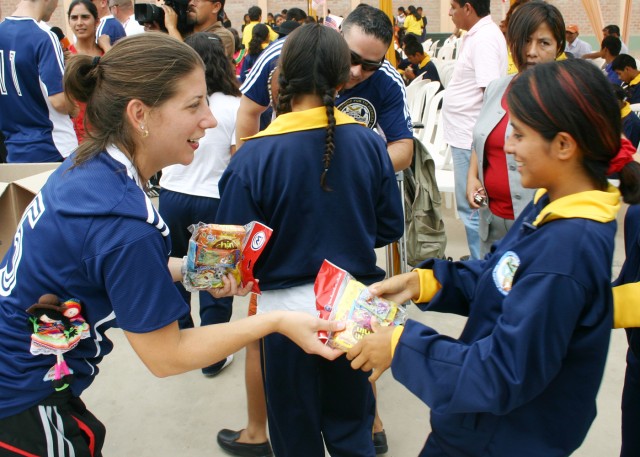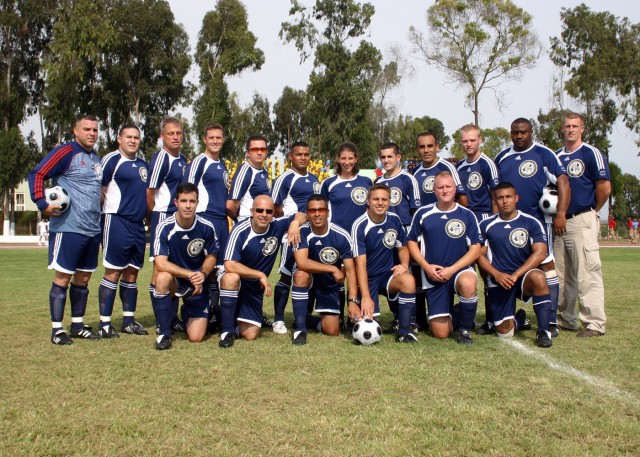As the only female on a soccer team of Soldiers, Sailors, Marines, Coast Guardsmen and Airmen, one could excuse Jill Hauser for feeling out of place on a recent friendship tour through South America.
But the recreation specialist with U.S. Army Garrison - Miami credits her teammates for treating her like 'one of the guys' and used her special position to interact positively with the children that the team met, giving inspiration and hope.
On their two-week tour, the U.S. Southern Command Friendship Soccer Team visited seven orphanages in Peru and Paraguay, bringing school supplies, candy and their time to more than 700 children.
"The children were wonderful," Hauser said, noting the team played some teams of older kids.
"They guys can say they weren't really trying [when they played]" she said, "but those kids scored some goals, they were very good."
In between visits they played friendly matches with cadet and unit teams from their host nations. Playing time for the 18-member team was divided, and Hauser, at forward and midfield, found herself with her own fan club.
"They would chant my name when I went on, and booed when I went off," she said.
Hauser wasn't put in for show, said team captain and Marine Capt. Luis Murguia.
"It was novel for them to see her out there, but she held her own - she is in better shape than a lot of us," Murguia said. The team had practiced for three months during lunch prior to the tour.
The attention continued after the matches, when the team would sit down for a meal with the host group, and Hauser found herself posing for photos and being introduced to both local military commanders and groups of female orphans.
"I sat down with a group of girls, and they asked me questions," Hauser said. "I let them know that women can do anything they want. One girl said she wanted to be a lawyer."
Visibly moved recalling the experience, Hauser said, "I felt like a ray of hope. And our purpose there was to help the children and start a friendship, to show that the U.S. is a positive thing, not 'big bad gringos'."
At another event, the local commandant complimented Hauser on holding her own on the field.
"I grew up in Panama, and I'm hoping this is a sign of change. Many girls I know were not allowed to play sports. I hope we brought a positive message."
In the matches themselves, the team scored only one goal, in their last game.
"The first game, when the cadets lined up chanting and screaming, we couldn't hear each other," Hauser said. "By the last game we were playing tough; when [teammate Alonzo Cabrera] scored that goal we were ecstatic. Our keeper was like a flying cat, and even blocked a penalty kick."
Although the final match ended 3-1, the team accomplished more than just running in the 100-degree heat.
Both countries want the team back, Murguia said, and the team members returned with a greater appreciation for what they have.
"There are a lot of things that we take for granted," he said. "Just giving out school supplies was a great feeling. But Jill, they wanted to talk to; and the most rewarding was at the girls' orphanages, they were inspired by her."




Social Sharing